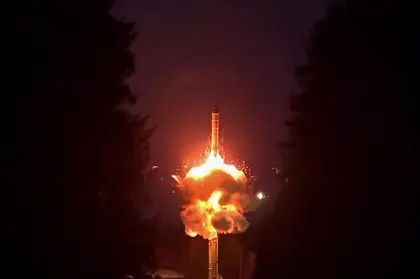Russia’s military held ballistic missile drills on Wednesday evening, in what the country’s defense minister said was a drill to practice “delivering a massive nuclear strike.”
What did the drill involve?
JOIN US ON TELEGRAM
Follow our coverage of the war on the @Kyivpost_official.
The Kremlin said ballistic missiles had been fired in the Russian Far North.
“Under the leadership of the Supreme Commander-in-Chief of the Russian armed forces, Vladimir Putin, a training exercise was conducted with the forces and equipment of ground, sea and air components of nuclear deterrent forces,” it said in a statement.
It said one of the missiles was fired from the Plesetsk cosmodrome in the Russian north and that another missile was fired from a nuclear-powered submarine in the Barents Sea.
Moscow said “long range Tu-95Ms planes” took part in the training. It added that the drills checked the “level of preparedness of military command and control bodies.”
Was Putin involved?
Putin oversaw the drills, AFP reports, with Russian state TV showing him being briefed by Shoigu and armed forces chief Valery Gerasimov, who spoke by video link.
“Comrade Supreme Commander-in-Chief,” Sergei said, addressing Putin.
“Training is being conducted to direct the Armed Forces of the Russian Federation, during which the task of delivering a massive nuclear strike by strategic offensive forces in retaliation to an enemy nuclear strike will be practiced.”

Moldova Residents Caught in the Middle of Gas Fight
It was not clear from Shoigu's comments if the test had already taken place.
Is the timing significant?
Massively.
The exercises came hours after Moscow edged closer to revoking its ratification of the Comprehensive Nuclear Test Ban treaty which outlaws all nuclear detonations, including live tests of nuclear weapons.
Russia's upper house of parliament, the Federation Council, approved the revocation of the treaty earlier on Wednesday.
The 1996 treaty outlaws all nuclear explosions including live tests of nuclear weapons, but it has never come into force because some key countries – including the United States and China – have not ratified the treaty. To be revoked, it still needs to be signed into law by Putin.
The Russian leader said earlier this month he was “not ready to say” whether Russia needed to carry out live nuclear tests.
The drills also came after Russia said Wednesday it would study US proposals to resume dialogue on nuclear arms control, but that it would not accept them unless Washington dropped its “hostile” stance towards Moscow.
Will Russia use nuclear weapons?
Putin has repeatedly invoked Russia's nuclear doctrine since launching the full-scale offensive against Ukraine in February last year but has so far failed to follow through with his threat.
Last year, Putin said he was “not bluffing” about his readiness to use destructive weapons should Russia face an existential threat.
He has also sent tactical nuclear arms to Russia's ally Belarus, which neighbours the EU and helped Moscow launch its Ukraine offensive last year.
Tactical nuclear arms are battlefield weapons that, while devastating, have a smaller yield compared to long-range strategic weapons.
During a meeting with a group of donors in California in June, US President Joe Biden said that the threat of Putin's use of tactical nuclear weapons in Belarus was real.
“When I was out here about two years ago saying I worried about the Colorado River drying up, everybody looked at me like I was crazy. They looked at me like when I said I worry about Putin using tactical nuclear weapons. It's real,” Biden said
Is there a way forward for the international community?
The US and Russia used to regularly inspect each other's nuclear facilities and limit warheads under the New START treaty, but Moscow suspended the treaty in February amid tensions over Ukraine.
Deputy Foreign Minister Sergei Ryabkov told Russian news agencies that Moscow had received an informal memo from the US calling for renewed dialogue, but that talks were out of the question for now.
“The (US) suggests putting dialogue on strategic stability and arms control on a systematic footing, doing so in isolation from everything that is going on,” Ryabkov said.
“We are not ready for this,” he added.
“It is simply impossible to return to dialogue on strategic stability, including New START... without changes in the United States' deeply, fundamentally hostile course towards Russia,” he said.
You can also highlight the text and press Ctrl + Enter










